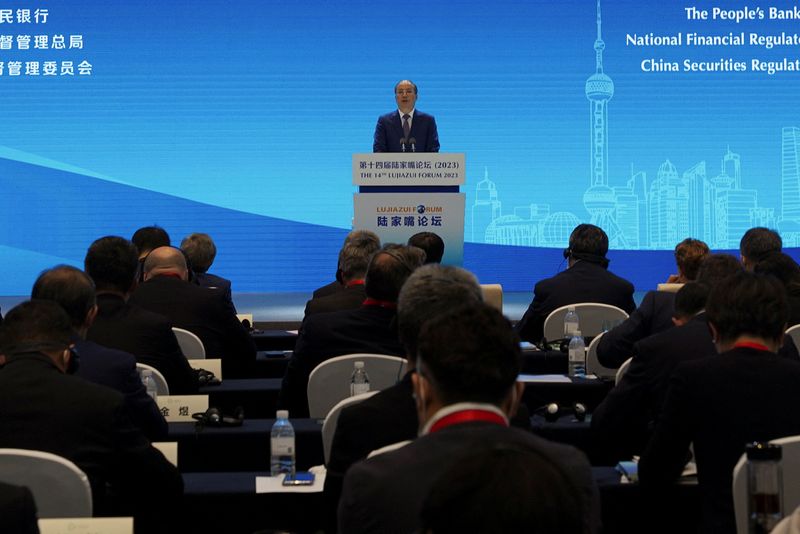By Samuel Shen and Tom Westbrook
BEIJING/SHANGHAI (Reuters) -China has ousted the head of its securities watchdog, the official Xinhua news agency said, replacing him with a veteran regulator with a reputation for tough action as policymakers struggle to stabilise the country's stock markets.
The cabinet has replaced Yi Huiman as chairman of the China Securities Regulatory Commission (CSRC) with Wu Qing, who has led the Shanghai Stock Exchange and served as a key deputy in Shanghai's municipal government, Xinhua said on Wednesday.
It did not give a reason for Yi's removal, which comes as China's stock markets have hit five-year lows and left institutional and retail investors scrambling to cut their losses as China's struggling economy and a lack of forceful government stimulus measures take their toll on confidence.
Chinese markets have been roiled by near constant turmoil since 2019, first by a trade spat with Washington, then by the collapse of indebted developer China Evergrande (HK:3333) amid the crisis that has torn through the country's real estate market.
Numerous market-focused support moves such as restrictions on short-selling or reductions in trading costs have failed to staunch the selloff, as have a number of government statements promising support but lacking details.
Yi's exit comes just ahead of the long Lunar New Year break. Trading in Chinese stocks is suspended for a week starting from Friday, giving markets time to fully digest the change.
"As a knee-jerk reaction, I can see how this would be viewed as positive. But in addressing the well understood issues of the Chinese economy, it doesn't address anything at all," said Tim Graf, the head of EMEA macro strategy at State Street (NYSE:STT).
The {{28930|FTSE ChChina A50 Index Futures edged up after the news, with a gain of 0.2% as of 1027 GMT. Hong Kong's Hang Seng futures were little changed on Wednesday evening.
Foreign investors sold a net 18.2 billion yuan ($2.5 billion) in Chinese equities last month to notch a sixth straight month of outflows, and the central bank has been persistently supporting the yuan currency.
While world stocks rose 20% last year, gold 13% and bitcoin 155%, China's blue-chip CSI300 fell 11%. It has fallen for 6 months in a row and is down 23% since August to five-year lows.
Fresh vows of support by state-linked buyers and a Bloomberg report that President Xi Jinping would meet market regulators drove a rally on Tuesday and Wednesday, but the mood remains fragile and investors sceptical.
BROKER BUTCHER
Yi, a veteran of the Industrial and Commercial Bank of China - which he joined as a junior loan officer at a branch in Zhejiang in 1985 - was appointed to head the CSRC in January 2019.
Under Yi, the CSRC ramped up measures to defend the stock market this year, suspending brokerages from borrowing shares for lending, curbing margin-lending and other derivatives and even getting exchanges to halt selling by some hedge funds.
China state fund Central Huijin Investment had also stepped up investments in Chinese stock exchange traded funds (ETFs).
"It's not unexpected as someone has to be accountable for the market mess, but the timing is interesting," said Yang Tingwu, vice general manager of Tongheng Investment.
Previous CSRC chairmen mostly were bankers, but Wu was a securities regulator, so his mission appeared to be to catch any companies or bankers cheating investors, he said.
"Wu is dubbed broker butcher, so we expect to see forceful regulations," Yang said, adding he expected some brokerages and individuals would face penalties for market disruptions.
A series of crackdowns on sectors from technology to education has tested investor patience and China's underwhelming recovery from COVID-19 pushed them to sell.
"It's not the first time China fired a CSRC chairman during a market rout. Thus change signals leaders' willingness to turn the market around," said Xu Tianchen, senior economist at the Economist Intelligence Unit (EIU).
In 2015, a plunge in China's stock market and a surprise devaluation of the yuan roiled global markets, and a botched stock market rescue attempt tarnished Beijing's pledges of reforms and broad policy-making credentials.
In early 2016, China removed Xiao Gang, then head of its securities regulator, replacing him with a top state banking executive, as leaders sought to restore confidence.
EIU's Xu said that Wu's appointment ends the practice where commercial bankers head the CSRC.
"Wu's previous experience in the securities industry - across regulators and exchanges - will hopefully bring some changes towards 'leaving it to the professionals,' said Xu.
Wu also replaced Yi as the Communist Party chief at the regulator, Xinhua said.

This announcement did not include the phrase "to be appointed to other roles", which usually suggests an outgoing chairman is taking another position, an ex-CSRC official said.
($1 = 7.1941 Chinese yuan renminbi)